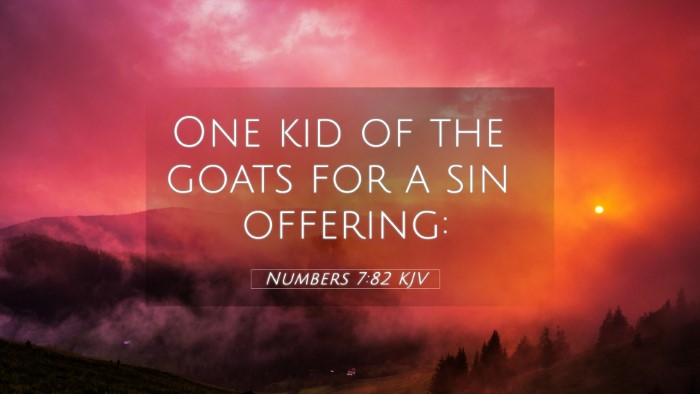Understanding Numbers 7:82
Verse: Numbers 7:82 states: "And for the sacrifices of peace offerings, there were two oxen, five rams, five he-goats, and five lambs of the first year: this was the offering of Ahiezer the son of Ammishaddai." This verse is part of a detailed account concerning the offerings made by the leaders of Israel during the sacred dedication of the Tabernacle.
Verse Meaning and Interpretation
This verse is significant in illustrating the communal worship practices of Ancient Israel and the importance of sacrifices in their relationship with God. It highlights:
- The Role of Offerings: The offerings signify devotion, gratitude, and the atonement of sins.
- Leadership in Worship: The mention of Ahiezer shows that leaders played a crucial role in representing the people before God.
- Variety of Sacrifices: The different types of animals represent the richness of their worship and the diversity of offerings acceptable to the Lord.
Commentary Insights
To gain a deeper understanding of Numbers 7:82, we can reference several public domain commentaries:
- Matthew Henry: Henry emphasizes the significance of public, communal sacrifices as a means of seeking God’s favor and fostering unity among the Israelites.
- Albert Barnes: Barnes elaborates on the specific types of offerings, noting that they symbolize different aspects of reconciliation and communion with God, shedding light on the ritualistic practices of the time.
- Adam Clarke: Clarke draws attention to the historical context, explaining that these offerings were critical during the consecration of the Tabernacle, reflecting the overall covenant relationship between God and His people.
Bible Cross-References
This verse is enriched by its connections with other scriptures. Here are several cross-references that can enhance your study:
- Leviticus 3:1-5 - Describes the peace offerings, offering insight into the ritual itself.
- Exodus 29:38-42 - Lays out the daily offerings that underline the importance of regular worship.
- Numbers 7:11 - Provides similar accounts of offerings made, emphasizing the role of leaders.
- 1 Corinthians 10:16-21 - Connects Old Testament sacrifices with New Testament principles of communion and sharing in the body of Christ.
- Romans 12:1 - Encourages believers to present their bodies as living sacrifices, paralleling the Old Testament practices.
- Hebrews 13:15-16 - Discusses the sacrifices of praise and good works, drawing a thematic line from the Old Covenant to New Covenant practice.
- John 1:29 - Presents Jesus as the ultimate sacrifice, fulfilling the types and shadows found in the offerings of the Law.
Tools for Bible Cross-Referencing
For studying connections between Bible verses and improving your understanding, here are some valuable tools:
- Bible Concordance: A comprehensive index of words used in the Bible, allowing users to find themes and keywords.
- Bible Cross-Reference Guide: A book or digital resource that lists verses alongside their related scriptures for easy navigation.
- Bible Chain References: A method of connecting verses through topical chains, guiding readers through linked themes.
Connecting Biblical Themes
Cross-referencing biblically allows for a richer understanding of themes consistent throughout scripture. For example:
- Inter-Biblical Dialogue: Studying Numbers 7:82 in light of New Testament teachings reveals the continuity of God’s redemptive plan.
- Comparative Bible Verse Analysis: Analyzing Old Testament sacrifices alongside Jesus' sacrifice enhances our appreciation of the cross and the fulfillment of prophecy.
Conclusion
In summary, Numbers 7:82 is a vital verse that teaches us about the importance of offerings, the role of leaders, and the belief system of ancient Israelites. Through careful cross-referencing with other scriptures, one can gain a deeper comprehension of biblical themes and God’s continuous revelation throughout history.


